AMD Zen 3 Ryzen Deep Dive Review: 5950X, 5900X, 5800X and 5600X Tested
by Dr. Ian Cutress on November 5, 2020 9:01 AM ESTCPU Tests: Legacy and Web
In order to gather data to compare with older benchmarks, we are still keeping a number of tests under our ‘legacy’ section. This includes all the former major versions of CineBench (R15, R11.5, R10) as well as x264 HD 3.0 and the first very naïve version of 3DPM v2.1. We won’t be transferring the data over from the old testing into Bench, otherwise it would be populated with 200 CPUs with only one data point, so it will fill up as we test more CPUs like the others.
The other section here is our web tests.
Web Tests: Kraken, Octane, and Speedometer
Benchmarking using web tools is always a bit difficult. Browsers change almost daily, and the way the web is used changes even quicker. While there is some scope for advanced computational based benchmarks, most users care about responsiveness, which requires a strong back-end to work quickly to provide on the front-end. The benchmarks we chose for our web tests are essentially industry standards – at least once upon a time.
It should be noted that for each test, the browser is closed and re-opened a new with a fresh cache. We use a fixed Chromium version for our tests with the update capabilities removed to ensure consistency.
Mozilla Kraken 1.1
Kraken is a 2010 benchmark from Mozilla and does a series of JavaScript tests. These tests are a little more involved than previous tests, looking at artificial intelligence, audio manipulation, image manipulation, json parsing, and cryptographic functions. The benchmark starts with an initial download of data for the audio and imaging, and then runs through 10 times giving a timed result.
We loop through the 10-run test four times (so that’s a total of 40 runs), and average the four end-results. The result is given as time to complete the test, and we’re reaching a slow asymptotic limit with regards the highest IPC processors.
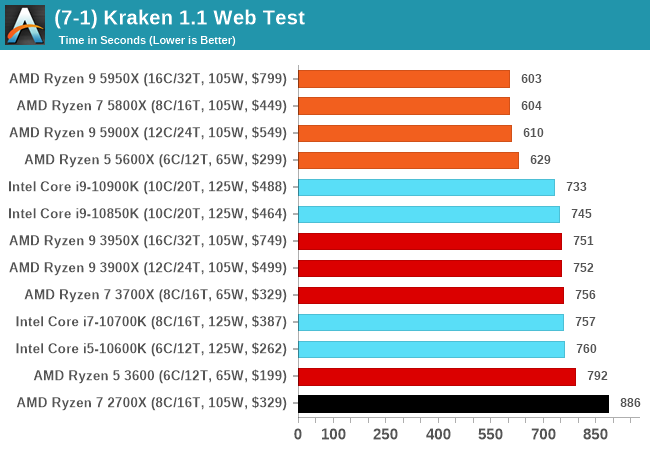
Google Octane 2.0
Our second test is also JavaScript based, but uses a lot more variation of newer JS techniques, such as object-oriented programming, kernel simulation, object creation/destruction, garbage collection, array manipulations, compiler latency and code execution.
Octane was developed after the discontinuation of other tests, with the goal of being more web-like than previous tests. It has been a popular benchmark, making it an obvious target for optimizations in the JavaScript engines. Ultimately it was retired in early 2017 due to this, although it is still widely used as a tool to determine general CPU performance in a number of web tasks.
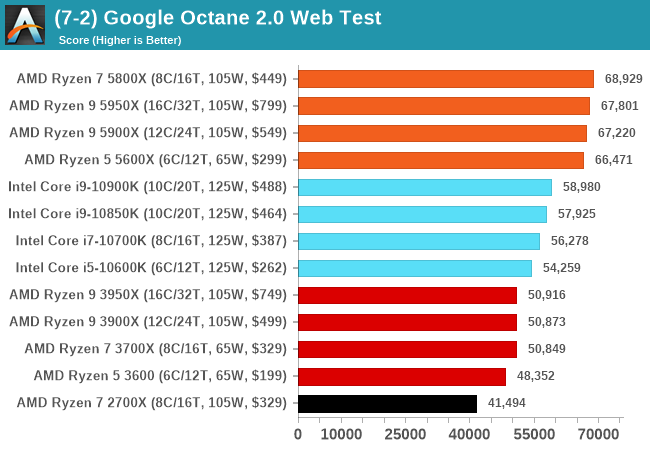
Speedometer 2: JavaScript Frameworks
Our newest web test is Speedometer 2, which is a test over a series of JavaScript frameworks to do three simple things: built a list, enable each item in the list, and remove the list. All the frameworks implement the same visual cues, but obviously apply them from different coding angles.
Our test goes through the list of frameworks, and produces a final score indicative of ‘rpm’, one of the benchmarks internal metrics.
We repeat over the benchmark for a dozen loops, taking the average of the last five.
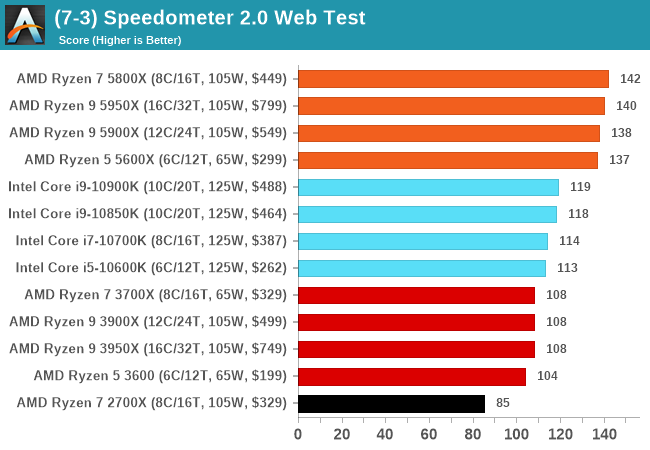
Legacy Tests
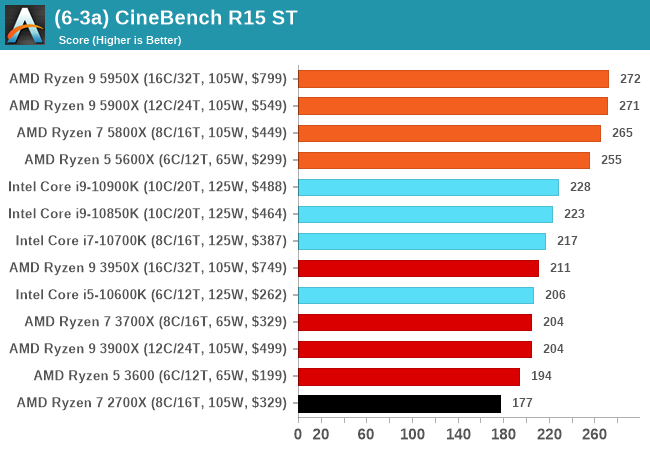
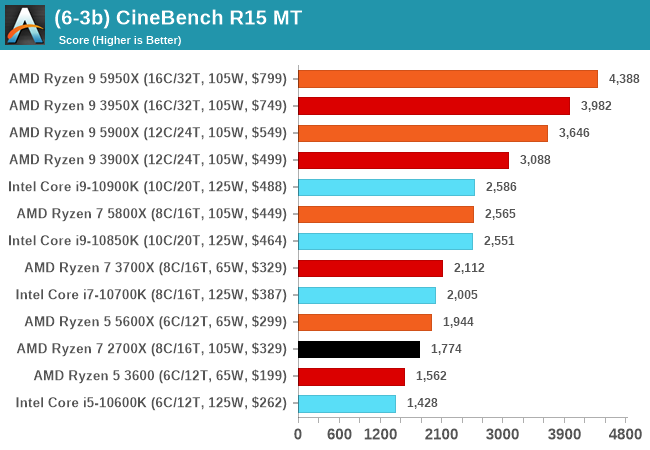
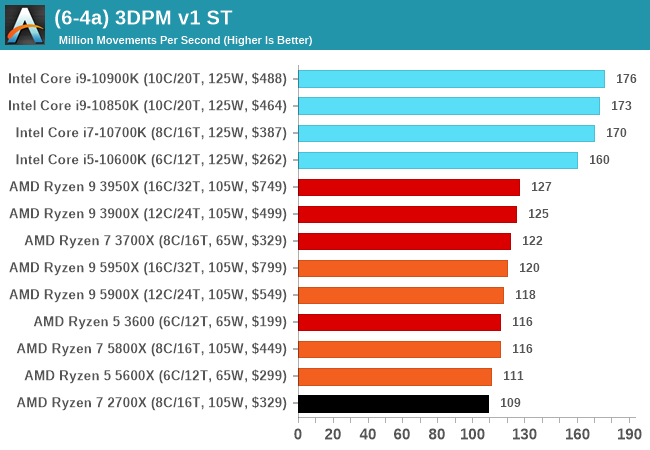
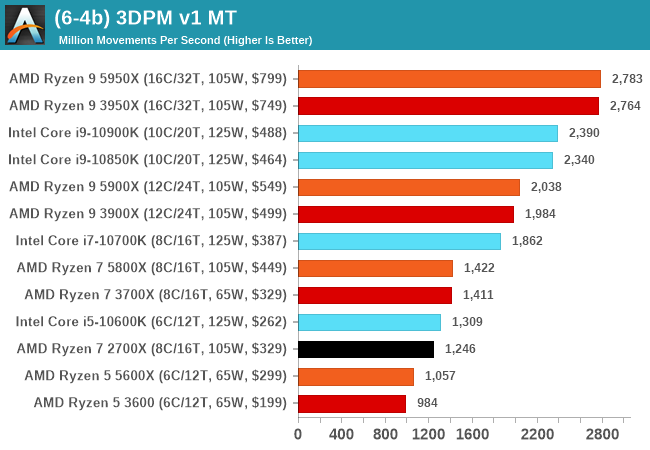


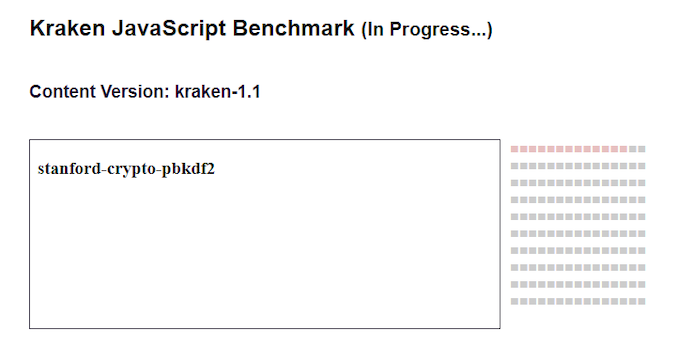
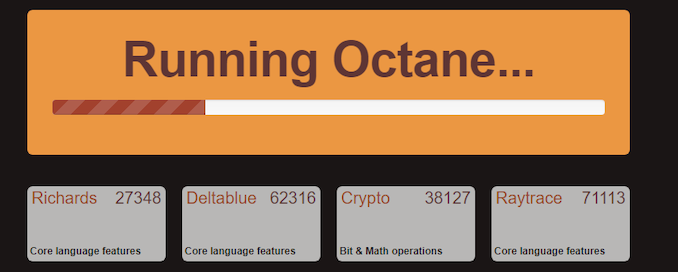
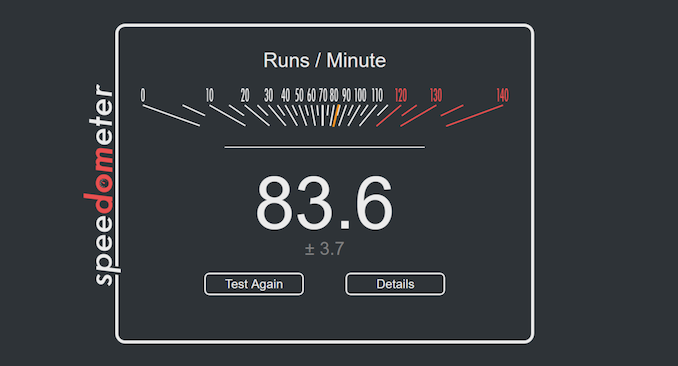








339 Comments
View All Comments
Threska - Monday, November 16, 2020 - link
Depends upon advantage.https://www.fool.com/investing/2020/11/16/nvidia-l...
FreckledTrout - Thursday, November 5, 2020 - link
AMD finally has an Intel beater on its hands at least until Rocket Lake arrives. Having actual competition is going to be great computing. Nice review.duploxxx - Saturday, November 7, 2020 - link
nothing confirmed on Rocket Lake...fishy results with a so-called avg turbo ghz which actually shows it was doing 5ghz.
a total unknown release date, expected at the end of Q1 2021 on a dead platform with some kind of pcie-4 . yeah really looking forward.
Spunjji - Sunday, November 8, 2020 - link
They'd have to get north of 5.3Ghz consistently to beat AMD.I just don't think they can, which would make the product pretty hilarious - big die, lots of heat, no performance crown.
hbsource - Thursday, November 5, 2020 - link
Very impressive. I think I'm good with my 3950X until the next socket but the single thread uplift is very tempting.FireSnake - Thursday, November 5, 2020 - link
@Ian:"With AMD taking the performance crown in almost area it’s competing in"
Should this be:
"With AMD taking the performance crown in almost every area it’s competing in" ... missing every?
charlesg - Thursday, November 5, 2020 - link
Now to just find the 5950 in stock at NewEgg!faizoff - Thursday, November 5, 2020 - link
Quick question on encoding with Handbrake, the 4k encoding and even the others for that matter, what preset are they run? like fast, medium, slow? and what RF count are the encodes set to? Sorry if I missed those, don't see them at a glance. Amazing review as always. Best tech deep dive for me, I love to read the architectural breakdown.GeoffreyA - Monday, November 9, 2020 - link
I think AT is using Handbrake's presets: (a) Discord Nitro 480p30, (b) Vimeo YouTube 720p30, and (c) HEVC 2160p60. I went through them now and here are the settings:A) Medium, CRF = 21
B) Medium, CRF = 22
C) Slow, CRF = 24
If you were looking for the reference frames, they are 3, 1, and 4. And there's a possibility Anandtech might have altered the presets.
DigitalFreak - Thursday, November 5, 2020 - link
Does Purch require you to use at least one bad pun in every article?